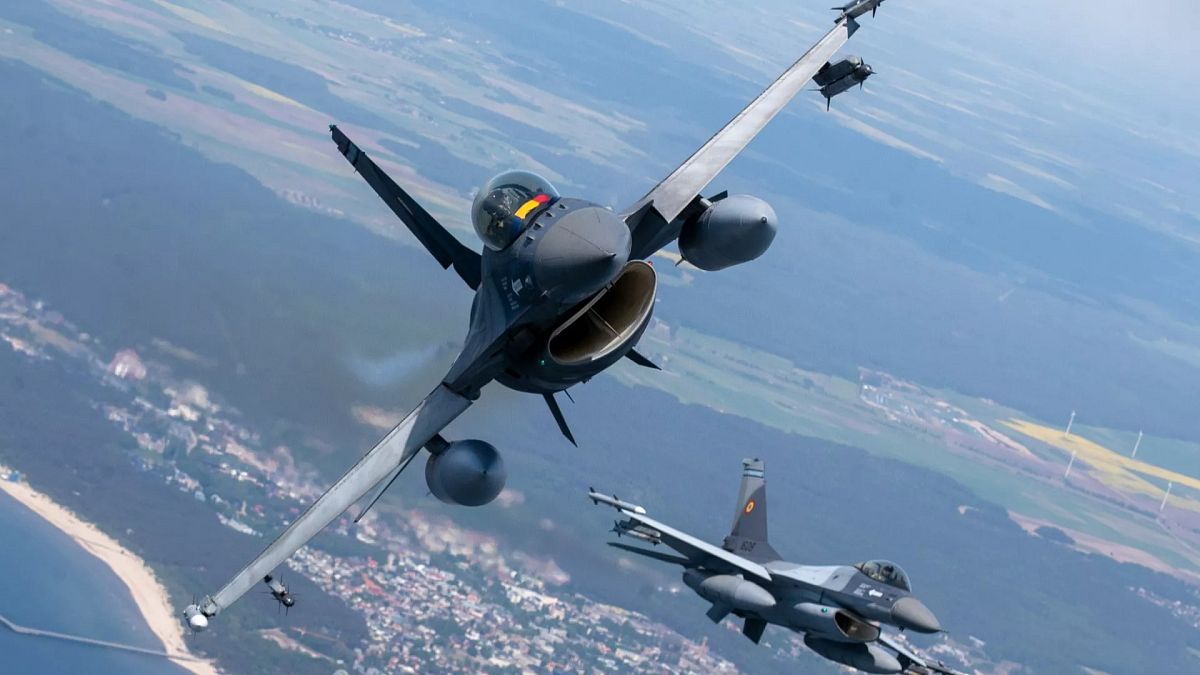A growing number of NATO allies are calling for harmonising national caveats that hinder the alliance’s ability to respond quickly to threats such as airspace violations — but the task is likely to be arduous.
As defence ministers from the 32 member states gathered in Brussels for a meeting on Wednesday, most allies called for a reduction in the use of national caveats in northern or eastern Europe, where an increasing number of airspace violations has been recorded in recent weeks.
Swedish Defence Minister Pål Jonson said “there’s room for improvement within the alliance” and that his country’s model should “inspire others”.
“It’s the mandate of the pilot, or commander of the surface vessels to make the call and that’s good,” he added.
His Dutch counterpart similarly lamented that different regulations among allies “make(s) it complicated when things get tough.”
“When the F35s are up in the air, you need to make sure that for everyone it’s very clear what the regulations are, the rules of engagement, and how then to also get to an agreement with the authorities,” Ruben Brekelmans said.
“We support the efforts by SACEUR by making sure that those regulations are harmonised and that we have one set of rules for this,” he added.
The two ministers echoed the US ambassador to NATO, Matthew Whitaker, who told journalists earlier this week that “it’s no secret that the more ‘national caveats’ there are on — especially our fighter jet assets — the harder it is for SACEUR to respond immediately.”
“Those are conversations that we’re going to continue to have within the alliance and to make sure that … where they can be reduced, they can be reduced,” he said.
‘Holding us back’
In effect, these caveats are limitations each nation places on the use of its forces during NATO missions.
In Afghanistan, for instance, some allies placed restrictions on where their forces could be deployed, what kind of weapons they were allowed to use and under what circumstances they could use them.
Another recurrent caveat is the requirement that the top national officer deployed to the NATO mission must first secure authorisation from their home country before taking part in any new operation.
When it comes to rules of engagement for airspace violations, one nation may allow an object to be shot down based on radar readings, whereas another may require visual confirmation first. They may also have different rules on what weapons their fighter jets can be equipped with.
This makes it very difficult for the Supreme Allied Commander (SACEUR), NATO’s top military authority, to act quickly in times of crisis.
NATO officials are nonetheless saying that national caveats were not a problem last month when nearly 20 drones violated Poland’s airspace, prompting NATO to deploy multiple fighter jets to neutralise some of them.
Mark Rutte, NATO’s secretary general, told reporters on Wednesday that allies responded “as we should have”. But he conceded earlier this week in Slovenia that national caveats “are holding us back” and “making us less effective”.
‘A greater appetite’ to resolve the issue
Complaints about how national caveats are hindering the alliance’s effectiveness are not new. NATO leaders already discussed reducing their use at a summit in Riga in 2006, in the context of operations in Afghanistan. These talks didn’t yield much.
In part, that’s because caveats are first and foremost political decisions, Rafael Loss, a senior policy fellow at the European Council on Foreign Relations (ECFR), told Euronews.
“Ultimately, it’s about citizens of those countries either dying or killing in the name of NATO and so that is the highest sort of sovereign decision that governments hold on to,” Loss said.
What they show, he added, is that “NATO in the end still consists of 32 different countries.”
But the global geopolitical landscape has vastly changed since the early 2000s, and the sense of urgency in Europe is much more acute due to Russia’s belligerence.
Airspace violations, some of them blamed on Russia, were also observed in Estonia, Romania and Denmark in rapid succession last month.
“I think given that the current security environment is much more immediately threatening and requires an urgent response, there is a greater chance that this time around, relating to air defence on the eastern flank, NATO has some greater appetite to really work through this difficult issue,” Loss said.
However, he added, the idea that national caveats could soon become a thing of the past is “far-fetched”.
‘Shoot them down’
Some leaders, like Hungarian Prime Minister Viktor Orban, have said the issue is simple.
“If you have drones which do not belong to your state, shoot them down,” he said earlier this month from Copenhagen where EU leaders discussed the possibility of erecting a so-called drone wall.
But while, in theory, countries may have the right to down drones or fighter jets that violate their airspace, in practice it’s not as clear-cut, especially for NATO allies.
Some countries, including those on the eastern flank, may just not have the capabilities to do so and therefore rely on NATO missions for air policing. And then there is the political element.
“Even if you’re capable of unilaterally shooting down a potential threat, you still have to wrestle with the fact that if this is not a somewhat coordinated response, you face the risk of other NATO allies not agreeing with your course of action and thereby your actions fracturing alliance cohesion,” Loss said.
Rutte on Wednesday said he disagreed with calls for Russian planes to be systematically downed if they enter NATO airspace.
“I think you have to make sure that you are absolutely convinced whether yes or no it is posing a threat. If it is posing a threat, we can do everything needed to make sure the threat will not materialise,” he said.
But if it is not posing a threat, he continued, allies should ensure the plane “will gently be guided outside of our airspace.”

